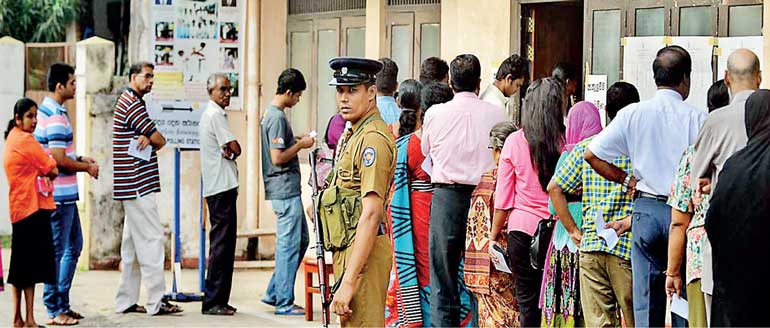Tuesday Feb 24, 2026
Tuesday Feb 24, 2026
Saturday, 4 October 2025 00:10 - - {{hitsCtrl.values.hits}}

The citizenry vote for political leaders in the hope that ‘this time’ there will be change for the better
The ethos of Sri Lankan politics is such that political party leaders prefer to nominate candidates who will sweep the polls even if their ethics are questionable. In doing so, it entrenches the patron-client system in which government and citizenry are both complicit in the model of transactional politics whereby “political parties have become election and patronage machines”
 It has been a year since a new government voted in by the people of Sri Lanka brought the issue of types of political leadership into the forefront of reflective civics.
It has been a year since a new government voted in by the people of Sri Lanka brought the issue of types of political leadership into the forefront of reflective civics.
In the dark years preceding this unprecedented regime change, the Aragalaya (‘people’s struggle’) critically engaged with a ‘strongman administration’ that promised much but delivered little. It also ended in ignominy despite the hype and hoopla of its apologists.
The issues that led up to our island-nation defaulting on its sovereign debt repayments and subsequent bankruptcy brought on widespread introspection on what failures of governance in the past three decades – and attendant leadership styles – led to the country’s abysmal fate.
This has prompted academic research, as well as armchair curiosity, seeking to understand the issue of failures in governance by surveying the scarce literature on political leadership. And also by appropriating lessons still to be learned about the mirage of political messiahship which fails to live up to its promises.
It has led to assessing the contribution of leadership styles to failures in government over the past three decades and more as well as critiquing the ‘strongman’ style of political leadership based on personal ambition fuelled by the attractiveness of ‘Great Man’ theories.
Critics of the style have striven to evaluate the most pertinent aspects of other leadership approaches in search of the holy grail – a holistic framework for a fresh take on political leadership in Sri Lanka today, arguing inter alia as to why ‘strongman’ administrations need to be a thing of the past.
Perhaps no more pressing a time than when past presidents – who came into power through parliamentary procedure rather than a poll, and on the broken back of the Aragalaya then (one they broke through heavy-handed policing) – are accusing those who defeated them democratically of implementing a constitutional dictatorship.
The past is prologue
In the year or so past, which featured presidential and parliamentary elections in Sri Lanka, the topic of political leadership in the land became paramount for electors considering their options in a crowded field of aspirants to high executive office (September 2024) and legislative representation (November of the same year.).
It continues to be an important subject for scrutiny and reflection a year later. It is especially pertinent in a milieu where political pundits among other socio-political critics including academic commentators and senior journalists observe the parlous state of the polity in recent times (if they’re progressives or people simply fed up) and even today (in the case of the Establishment’s old guard).
The general sense among many people of voting age since the Aragalaya is that in addition to the regime change that was ostensibly effected in July 2022, there is a need for ongoing ‘systemic change’ including in the calibre and character of national leadership.
After the landmark polls of 2024, a sea change into something rich and strange – a new paradigm of doing politics that is emerging, and still being cannily developed by a fresh set of practitioners – has eventuated. It has done so to mixed reactions.
On the one hand, there is the rump of the Old Guard: laughing away as parvenus those who profess to have rescued the nation from the doldrums by their sagacity, and lampooning as arriviste buffoons those whose pronunciation of the Queen’s – much less pronouncements about ‘Nobel Prizes’ – are not the cup of the tea of the Establishment.
On the other, a surprisingly large number of people from the same demographic – deserters from the ‘Ancien Regime’ and newfound camp-followers of the progressive element in politics – have embraced the ostensibly clean, simple and straight-talking political culture as perhaps best embodied by the personage at the helm of state today.
The salt of sea change
This sense may be compounded by a growing understanding that in the past, since virtually immediately after Sri Lanka’s independence, successive electorates have voted repeatedly for politicians lacking in leadership acumen, moral fibre, socio-political skills, appropriate ethical conduct, a sense of probity and responsibility, and a deep-rooted gravitas to govern.
While the focus has often been on growth, development and progress (one type of ‘GDP’; much vaunted by those in city, chamber and cocktail circuit who saw in future Colombo a facsimile of present Singapore), there has been severely lacking the genuineness, decency, and professionalism (another type of ‘GDP’) at the heart of a more salutary political leadership.
As a senior journalist essayed recently: Sri Lanka has chronically elected “crooks, charlatans, the incompetent, the corrupt, and the utterly unrepentant of their litany of crimes”.
And the same editorialist added that “to add insult to injury [they] still have the gumption to stand for public office as if their House is in the order they say they want the Nation to be in”.
As other political analysts and electoral commentators have also observed, the citizenry vote for political leaders in the hope that ‘this time’ there will be change for the better. But the electorate is disappointed time and again.
And ‘next time’ round too, the voting population opts to invest their faith in the electoral system – to say nothing of essentially the same political leadership figures albeit with a few new faces – all over again.
As a brace of Colombo University academics observed: “There is also a growing dissatisfaction with, and a lowering of trust in, the functioning of political parties. This has led to a paradoxical situation. People feel that the political parties are essential to the functioning of democracy but do not seem to trust them for making democracy work” (Uyangoda and Pieris, 2009).
It is the people who make up these parties, especially their respective party leaderships, which is part of the problem.
Leadership-deficit
It is also a perennial or cyclical problem that has many other root causes; including especially a deficit in the type, tenor, and timbre of political leadership necessary to govern well, accountably, and with transparently shared power.
Some of the roles that political leaders of Sri Lanka, past and present, have played in the development of this paradoxical situation is lamentable.
The ethos of Sri Lankan politics is such that political party leaders prefer to nominate candidates who will sweep the polls even if their ethics are questionable.
In doing so, it entrenches the patron-client system in which government and citizenry are both complicit in the model of transactional politics whereby “political parties have become election and patronage machines” (Uyangoda and Pieris, 2009).
This necessitates that the calibre of contestants seeking public office leaves much to be desired in terms of moral, ethical, and personal integrity; entrenching a political culture where those whom voters elect to lead the country seek to serve themselves and their cronies, relatives, and vested interests among the elites who paved their path to power, and not the people who voted them in or the country’s most pressing causes.
In this and a succession of columns ahead, we will look at the underlying issue of a leadership deficit today from a conceptual point of view, and attempt to develop a meaningful holistic framework for aspiring Sri Lankan politicians, party machines and their respective leaderships, and voters in general as well.
The goal is to take cognisance of the need for a more representative, accountable, inclusive, pluralistic, and inter-relational style of transparent accountable leadership (despite empirical evidence to the contrary and the experience of decades indicating otherwise) – a new model that is (despite its theoretical underpinnings) a planned, purposeful, practical, and principle-oriented – not a personality-oriented – one.
(Editor-at-large of LMD | Post-graduate diplomate in politics and governance)